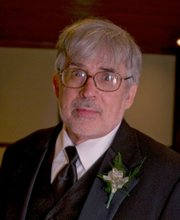I've always envied the Irish—they know how to live. And by live, I mean more than just survive each day. If you can say anything about the Irish heritage, it's that they can celebrate moments. I know, "insert Irish drinking joke here." But beyond the pints, these are folks who could treasure a milestone—even some of the ones we'd sooner forget. Like death.
My family isn't Irish. We're a hybrid of Scottish and Welsh, and at some point a Swede got into the gene pool and contributed the blond hair. But other than genetics, I've always associated my family with the Irish in our general approach to life and community. We're loud, we're rough, we have tempers; we have a keen appreciation for a finely honed insult, and we celebrate life's joys the same way we celebrate the tragedies—we gather together, and we tell stories.
This past month, we lost an irreplaceable member of the Kenyon family, my uncle, Dr. Wynn Kenyon. This was a man you never forgot once you met him. He had an explosive laugh that startled you even when you were prepared for it, he had a repertoire of used jokes but his telling of them never got old, and he achieved celebrity status at Belhaven University, where he chaired the philosophy department. Wynn was equal part Socrates and the Absent-Minded Professor—a man who could deliver a stunningly brilliant lecture on existentialism while wearing mismatched shoes. This was a man with no shortage of stories.
When he unexpectedly passed a few weeks ago, the family could have easily been driven to their separate corners by the shock. But that's not the way we do things. We, like the Irish, cope via stories. Even while Wynn was still in intensive care, those of us in the hospital sat outside and began to swap memories of him. No one ever suggested this; it just began to happen naturally. And through the weekend, as his condition deteriorated and he eventually passed, the stories never slowed. If anything, they intensified, with another story ready to be told almost before the first had finished. We told stories about the time he accidentally forwarded all his incoming calls to 911 or about his ability to consider any opposing viewpoint without judgment, no matter how greatly that view might have differed from his own. Family members, friends, students and everyone who met him had something to tell. Not just a kind statement about him being a nice guy, but fully fleshed out anecdotes that had the entire waiting area laughing —an odd sound in the hospital halls.
The stories continued as family members arrived in town and as friends posted on his memorial Facebook page (which exploded to more than 800 members in under a week). What could have been a time of anger and sadness was instead a time of laughter and memory, an appropriate epilogue for a man who spent so much of his life laughing. And through the telling of his stories, in large groups and over a full table of food, we found that despite the loss of one of our most memorable members, we are still a family. So, in my opinion, we didn't hold a funeral for Dr. Kenyon last month—we had a wake.
The Irish have the right idea. There's a potential joy in every moment, even the sad ones. And a life remembered is so much more powerful than a life mourned. The true luck of the Irish isn't chance that happens to favor you, it's leading a life full of fantastic stories—both happy and tragic—and being part of a community that knows how to properly retell them when you're gone—which means never leaving out the good parts.
Death really isn't a laughing matter. But maybe it should be.



Comments
Use the comment form below to begin a discussion about this content.